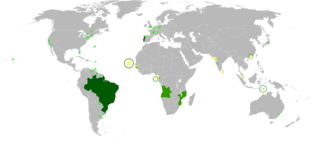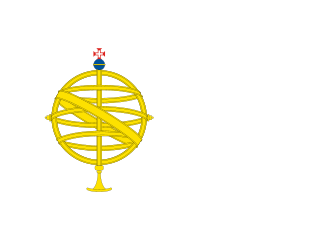
Portugal was the leading country in the European exploration of the world in the 15th century. The Treaty of Tordesillas in 1494 divided the Earth outside Europe into Castilian and Portuguese global territorial hemispheres for exclusive conquest and colonization. Portugal colonized parts of South America, but also made some unsuccessful attempts to colonize North America.
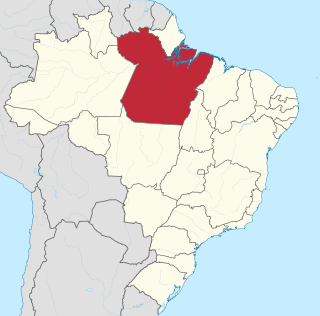
Pará is a state in northern Brazil traversed by the lower Amazon River. It borders the Brazilian states of Amapá, Maranhão, Tocantins, Mato Grosso, Amazonas and Roraima. To the northwest it borders Guyana and Suriname; to the northeast it borders the Atlantic Ocean. The capital and largest city is Belém, at the mouth of the Amazon at the Atlantic Ocean and the 11th most populous city in the country.

The Viceroyalty of Brazil refers, in narrow scope, to office of viceroy of the Portuguese colonial State of Brazil and, in broad scope, to the whole State of Brazil during the historic period when its governors had the title of "viceroy". The term "viceroyalty" however never officially designated the title of the colony, which continued to be designated "state". Until 1763, the title "Viceroy" was occasionally granted to some governors of Brazil who were members of the high nobility, with the remaining keeping the title "governor-general". From around 1763, the title "viceroy" became permanent, so being granted to all governors. The position of viceroy was abolished, when the Portuguese court transferred to Brazil in 1808, with the State of Brazil becoming directly administered by the Portuguese Government seated in Rio de Janeiro.

The Captaincies of Brazil were captaincies of the Portuguese Empire, administrative divisions and hereditary fiefs of Portugal in the colony of Terra de Santa Cruz, later called Brazil, on the Atlantic coast of northeastern South America. Each was granted to a single donee, a Portuguese nobleman who was given the title captain General. Except for two, São Vicente and Pernambuco, they were administrative and economic failures. They were effectively subsumed by the Governorates General and the States of Brazil and Maranhão starting in 1549, and the last of the privately granted captaincies reverted to the Crown in 1754. Their final boundaries in the latter half of the eighteenth century became the basis for the provinces of Brazil.

Count of Oeiras was a Portuguese title of nobility created by a royal decree, dated from July 15, 1759, by King Joseph I of Portugal, and granted to Sebastião José de Carvalho e Melo, head of the Portuguese government.

The Brazilian Athletics Confederation is the governing body for the sport of athletics in Brazil. President for the period 2013-2016 is José Antonio Martins Fernandes.

Barcelos,, formerly Mariuá, is a municipality located in the State of Amazonas, northern Brazil. Its population was 32,169 (2005) and its area is 122,476 square kilometres (47,288 sq mi), making it the second largest municipality in Brazil, equivalent in size to New York state in the United States and slightly larger than North Korea.
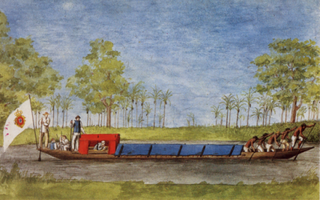
Alexandre Rodrigues Ferreira was a naturalist born in the Portuguese colony of Brazil. He undertook an extensive journey which crossed the interior of the Amazon Basin to Mato Grosso, between 1783 and 1792. During this journey, he described the agriculture, flora, fauna, and native inhabitants. Because of the energy and skill that he devoted to his explorations, he became known as the "Brazilian Humboldt".
Anselm Eckart was a German Jesuit missionary.

The State of Maranhão was the northernmost of two 17–18th century administrative divisions of the colonial Portuguese Empire in South America.
O Processo dos Távoras is a historical fiction television series produced by RTP, Antinomia Produções Vídeo and the Institute of Cinema, Audiovisual and Multimedia (ICAM) in 2001. It was written by Francisco Moita Flores, based on the Portuguese political scandal that occurred during the reign of D. José, in 1758. The series had a prominent place at the International Television Festival in Venice 2002.
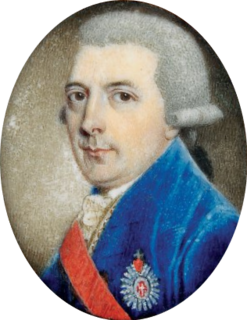
José de Seabra da Silva, was a Portuguese magistrate and politician.

Francisco Xavier de Mendonça Furtado (1701–1769) served in Portugal's armed services rising in rank from soldier to sea-captain, then became a colonial governor in Brazil and finally a secretary of state in the Portuguese government. His major achievements included the extension of Portugal's colonial settlement in South America westward along the Amazon basin and the carrying out of economic and social reforms according to policies established in Lisbon.
